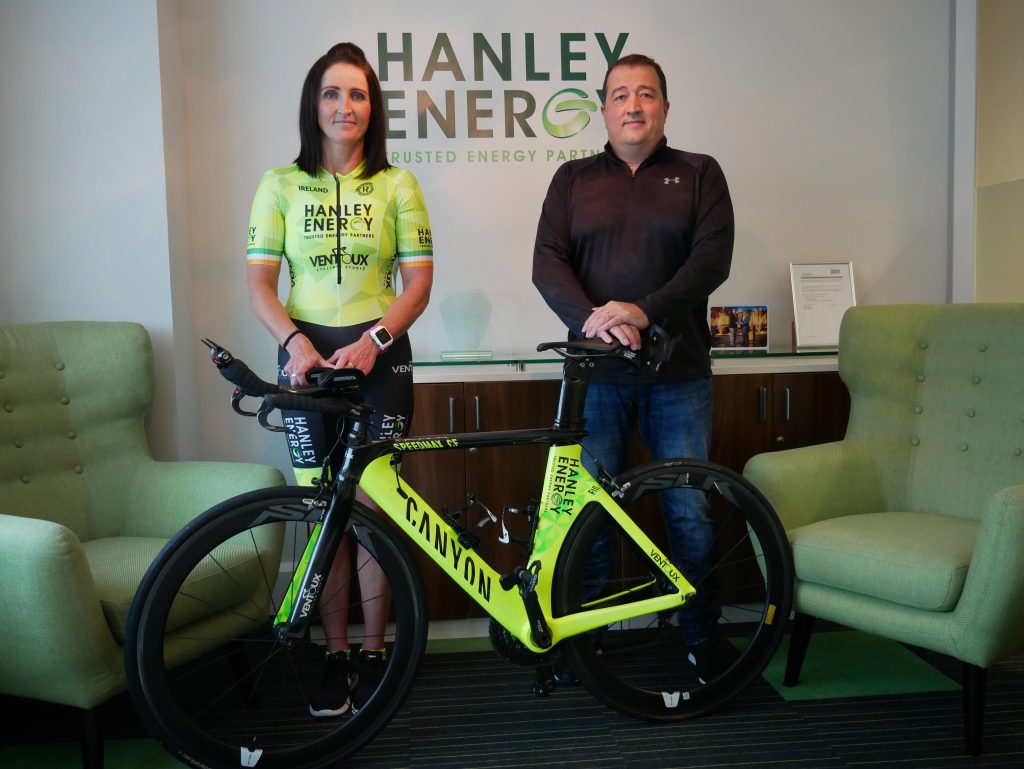Dedication to a relentless training regime puts Irish woman on global stage
Sheena Dullaghan is a shining example of what can be achieved through hard work, drive and sacrifice.
The amateur Irish triathlete has completed the Ironman 70.3 World Championships in Nice, France on September 7– 8, with an impressive time of 6.13. Using this race to work on her pacing and nutrition, Sheena is better prepared for the upcoming 2019 Ironman World Championship on Kona, Hawaii, taking place this October.
And after funding herself throughout her 10-year triathlon career, Dundalk native Sheena has just landed a sponsorship deal with Hanley Energy that she says will make an “unbelievable difference” to her.
Having qualified for the World Championships thanks to her performance in Barcelona in May, this will be Sheena’s first time doing two full Ironman races in a year. She says the main reason for this is the high cost – of equipment, travel, physiotherapy, race fees – but now her sponsorship with Hanley Energy is making it possible.
“I don’t buy shoes or clothes, I just buy Lycra and runners and bicycle gear,” she says. “I don’t go out, I don’t socialise. My money goes into what I love to do. I’ve funded all my own races for the last 10 years.
“So, this help from Hanley is going to make an unbelievable difference to me. As an individual triathlete, it’s very difficult to get support. I can’t thank Hanley Energy enough for what they are doing for me and for recognising me.”
A way of life
Competing in the 45-49 age group, Sheena puts her body through a gruelling training regime. 70.3 refers to the distance in miles of the event – a 1.2-mile (1.9 km) swim, a 56-mile (90 km) bike ride, and a 13.1-mile (21.1 km) run – and, as Sheena explains, attaining the standard for an elite event like the world championships is an enormous task which requires putting in the miles, day after day.
“I think getting to the start line, that’s your achievement,” she says. “It’s so difficult, because of all the sacrifices, the nutrition, managing the niggling injuries, everything you have to do to get to the starting line. You are training flat out and you get to the point where in training you are almost covering the full Ironman distances.”
Sheena is in the pool, on the bike and pounding the roads for up to 20 hours a week – and that’s on top of her day job as a spin instructor in her own business, Ventoux Cycling Studio outside Newry. She does at least two of her three disciplines every day – 16-17km a week over four sessions in the pool, she runs for about an hour on weekdays and up to three hours at weekends. Her bike rides can be up to six-hours long.
“You need a lot of determination. It’s just something in me… I enjoy the endurance of it,” she says.
“I love testing myself to see how far I can go, and to get stronger to be the best that I can. It’s just a way of life for me, it always has been. Some days are hard, it’s not always easy to get out of the bed at 5am to go training but I like getting it done and I just take it a day at a time.”
A member of the Setanta Triathlon Club in Dundalk, Sheena has a secret weapon in her personal life – her coach Peter Tomany is also her partner – but she admits family and friends often take a back seat to training.
“You do miss family stuff,” she says. “You are away a lot and you’re on the road a lot, you don’t see people as much and your social life suffers. Over the years my family didn’t really get it but they are starting to understand now what is involved and sacrifices you have to make.”
Thirst for a challenge
Hanley Energy managing director Dennis Nordon says he is humbled to be in a position to help Sheena. “We’ve got the easy part, she’s got the real challenge. Sheena mentioned that it’s about challenges, seeing how far you can push yourself. Myself and Clive [Gilmore, CEO] have taken that into Hanley Energy – that was our vision when we started the business.
“So, when we come across people who are doing exactly the same thing in a different field, that excites us. Especially if that person is an underdog, and our previous sponsorships reflect that – the Irish Taekwondo Association, the Irish women’s cricket team, and sailor Gregor McGuckin, who took part in the solo round-the-world Golden Globe race.
“Sheena’s is a huge, huge achievement for someone who is not a professional athlete, who doesn’t have the 10 coaches and the physios and the dieticians and the nutritionists. It annoys me to see soccer players being paid ridiculous amounts of money, and everything is done for them.
“Compare that to someone who is world-class but has to fund all of her training, as Sheena said, her Lycra and her runners, paying for it all out of her own pocket, and it’s easy for us to decide to sponsor her, it’s humbling and we’re very proud.”
Hanley Energy has a track record of investing in women in sport which reflects its commitment to equality across the business. “We’ve a very good gender balance in our core teams,” says Dennis. “We actively encourage applicants who are female, because in our field we find that many females tend not to go down the engineering route because it seems to be a male-dominated environment, but that’s changing for the better.”
Similarly, many sports have traditionally been male-dominated but participation and coverage of women’s sports have seen an increase in recent times, with big events such as this summer’s Women’s World Cup accelerating that change. But Sheena says her sport still has a long way to go.
Shifting sands
“In triathlon, it’s changing a little bit but certainly not enough. I will be lining up in Hawaii as one of fewer than 400 women out of field of 2,600 – so you can see the minority of females. Even in this year’s Cork Ironman in June, I don’t think there were 300 women in that race.
“But there is an initiative now called ‘Women For Tri’ and they’re really pushing to try to get female triathletes, maybe women who think they’re not able to do an Ironman, or who think ‘I would never be able to do what the men do’. You know, it’s still called an Ironman race…but we’re doing what the guys are doing. It’s slow to shift but I’m hoping that it will.
“And I’m hoping when I get there and I do it, that I’ll encourage other females to take on the challenge. We can do what the men do!”


